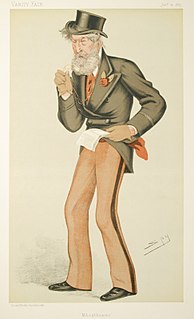 W
WPeter Burrowes was an Irish barrister and politician.
 W
WJohn Philpot Curran was an Irish orator, politician, wit, lawyer and judge, who held the office of Master of the Rolls in Ireland. He was renowned for his representation in 1780 of Father Neale, a Catholic priest horsewhipped by the Anglo-Irish Lord, Viscount Doneraile, and in the 1790s for his defence of United Irishmen facing capital charges of sedition and treason. His courtroom speeches were widely admired. Lord Byron was to say of Curran, "I have heard that man speak more poetry than I have seen written". Karl Marx described him as the greatest "people's advocate" of the eighteenth century.
 W
WDenis Daly of Carrownakelly and Dunsandle Castle, Loughrea, County Galway, was an Irish landowner and politician.
 W
WChristian Davies, born Christian Cavanagh also known as Kit Cavanagh or Mother Ross was an Irishwoman who joined the British Army in 1693 disguised as a man. She fought with the infantry in Flanders during the Nine Years War until 1697, then with the 4th Dragoons, later the 2nd Royal North British Dragoons and finally with the Scots Greys in the War of the Spanish Succession from 1701 to 1706. The author Daniel Defoe met her in old age when she was a Chelsea Pensioner and turned her story into a book entitled The Life and Adventures of Mrs. Christian Davies.
 W
WCharles James Patrick Mahon, known as the O'Gorman Mahon or James Patrick Mahon, was an Irish nationalist journalist, barrister, parliamentarian and international mercenary.
 W
WColonel Richard Martin, was an Irish politician and campaigner against cruelty to animals. He was known as "Humanity Dick", a nickname bestowed on him by King George IV. He succeeded in getting the pioneering Cruel Treatment of Cattle Act 1822, nicknamed 'Martin's Act', passed into British law.
 W
WDaniel O'Connell, hailed in his time as The Liberator, was the acknowledged political leader of Ireland's Roman Catholic majority in the first half of the 19th century. His mobilisation of Catholic Ireland through to the poorest class of tenant farmer helped secure Catholic emancipation in 1829 and allowed him to take a seat in the United Kingdom Parliament to which he had twice been elected. At Westminster O'Connell championed liberal and reform causes but failed in his declared objective for Ireland: the restoration of a separate Irish Parliament through repeal of the 1800 Acts of Union. Against the background of a growing agrarian crisis and, in his final years, of the Great Irish Famine, O'Connell contended with dissension at home. Criticism of his political compromises and system of patronage led to a split in the national movement he had singularly led.
 W
WDavid "Tiger" Roche, was a celebrated soldier, duellist and adventurer, variously hailed as a hero and damned as a thief and a murderer at many times during his stormy life. Roche was born to a middle-class family in Dublin in 1729 and received a gentleman's education, he was in fact so well turned out that his comportment sufficiently impressed the Lord Lieutenant of Ireland to offer him a military commission at sixteen years' old. Roche had fallen in with bad company and was possibly involved in an attack on a night watchman, one of many carried out by gangs of bucks at the time. He fled to North America where he volunteered during the French and Indian War. There his bravery and intrepidity impressed and he quickly rose to a high rank; until accused of theft from a fellow officer. Roche always denied the allegation, stating he had bought the gun in question, but according to the corporal from whom he claimed to have done so, Roche himself had stolen it. Roche was convicted and disgraced by Court Martial. Roche later attacked several people involved in the case, including the Corporal, after which he earned the nickname "Tiger".